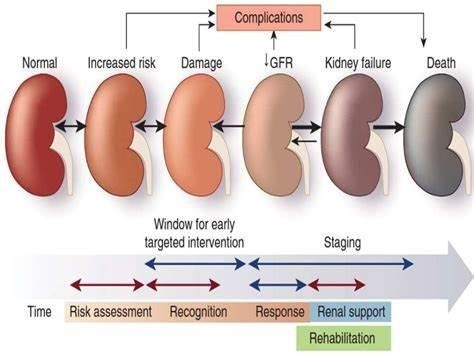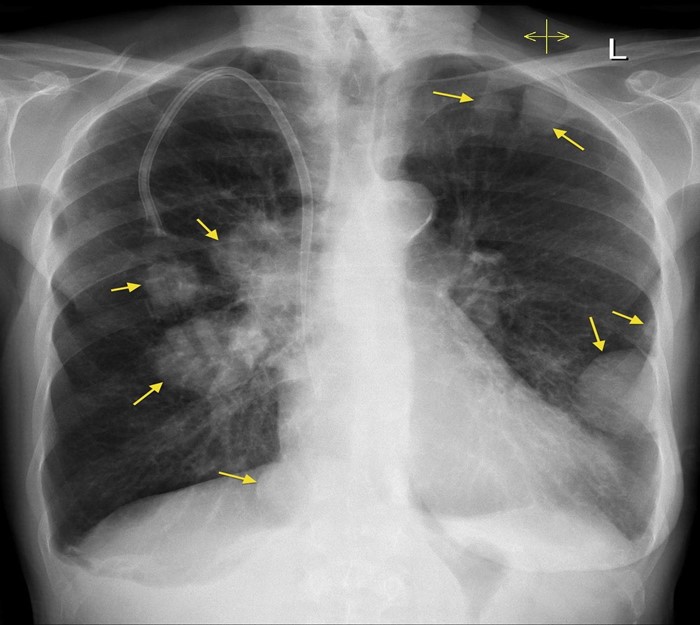Which client requires the most immediate intervention by the nurse?
An older adult receiving enteral feedings via feeding tube who has a temperature of 100.6°F (38.1°C).
A client with acute kidney injury who is somnolent and does not respond to verbal commands.
A young adult who experienced heat stroke and is receiving a normal saline intravenous (IV) fluid bolus.
A pregnant client with hyperemesis gravidarum who is receiving an infusion of Ringer's Lactate.
The Correct Answer is B
A) This client has a mild fever, which may indicate an infection or inflammation. This is a potential complication of enteral feedings, but it is not the most urgent situation. The nurse should monitor the client's vital signs, assess the feeding tube site, and notify the provider if the fever persists or worsens.
B) This client has signs of uremic encephalopathy, which is a life-threatening condition caused by the accumulation of toxins in the brain due to impaired renal function. The nurse should intervene immediately to prevent further
neurological damage and possible coma or death. The nurse should assess the client's level of consciousness, check the blood pressure and urine output, and prepare to administer dialysis or other treatments as ordered by the provider.
C) This client has heat stroke, which is a serious condition that can lead to dehydration, electrolyte imbalance, and organ damage. However, the client is receiving a normal saline IV fluid bolus, which is an appropriate intervention to restore fluid volume and correct sodium levels. The nurse should continue to monitor the client's vital signs, skin
temperature, and urine output, and watch for signs of fluid overload or cerebral edema.
D) This client has hyperemesis gravidarum, which is a severe form of nausea and vomiting during pregnancy that can lead to dehydration, malnutrition, and electrolyte imbalance. However, the client is receiving an infusion of Ringer's Lactate, which is an isotonic solution that can replenish fluid and electrolyte losses. The nurse should continue to monitor the client's vital signs, weight, and intake and output, and administer antiemetics or other medications as ordered by the provider.

Nursing Test Bank
Naxlex Comprehensive Predictor Exams
Related Questions
Correct Answer is B
Explanation
Choice A Reason: This is not the first priority because it is not a life-threatening condition. The male adolescent may have gastroenteritis or food poisoning, which can cause dehydration and electrolyte imbalance. The nurse should monitor his vital signs and fluid intake, but he can wait for further assessment.
Choice B Reason: This is the first priority because it is a potential surgical emergency. The female client may have appendicitis, which can cause peritonitis and sepsis if left untreated. The nurse should assess her pain level, vital signs, and abdominal signs, and prepare her for diagnostic tests and possible surgery.
Choice C Reason: This is not the first priority because it is a chronic condition that does not require immediate intervention. The elderly client may have intermittent claudication, which is a symptom of peripheral arterial disease. The nurse should educate him on leg care and exercise, but he can wait for further assessment.
Choice D Reason: This is not the first priority because it is a common condition that can be treated with antibiotics. The child may have a bacterial infection, such as bronchitis or pneumonia, which can cause productive cough and fever. The nurse should auscultate his lungs and check his temperature, but he can wait for further assessment.
Correct Answer is D
Explanation
Choice A Reason: This is not the first priority because it does not address the client's immediate needs. The nurse should obtain the client's legal records for power of attorney, but this can be done later.
Choice B Reason: This is a good action because it helps relieve the client's pain and discomfort. The nurse should give analgesic medications as needed (PRN), but this is not enough to meet the client's holistic needs.
Choice C Reason: This is not an appropriate action because it may cause harm to the client. The nurse should not discontinue the intravenous infusion without a valid reason and a healthcare provider's order.
Choice D Reason: This is the best action because it respects the client's wishes and provides him with quality end-of-life care. The nurse should ask the palliative care team to speak with the client and offer him emotional, spiritual, and physical support.

Whether you are a student looking to ace your exams or a practicing nurse seeking to enhance your expertise , our nursing education contents will empower you with the confidence and competence to make a difference in the lives of patients and become a respected leader in the healthcare field.
Visit Naxlex, invest in your future and unlock endless possibilities with our unparalleled nursing education contents today
Report Wrong Answer on the Current Question
Do you disagree with the answer? If yes, what is your expected answer? Explain.
Kindly be descriptive with the issue you are facing.
